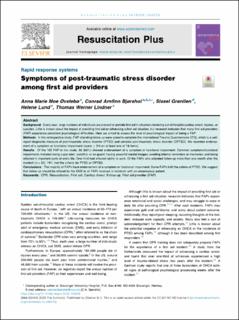Symptoms of post-traumatic stress disorder among first aid providers
Øvstebø, Anna Marie Moe; Bjørshol, Conrad Arnfinn; Grønlien, Sissel; Lund, Helene; Lindner, Thomas Werner
Journal article, Peer reviewed
Published version

Åpne
Permanent lenke
https://hdl.handle.net/11250/3084399Utgivelsesdato
2023Metadata
Vis full innførselSamlinger
- Department of Clinical Medicine [2066]
- Registrations from Cristin [9791]
Sammendrag
Background
Every year, large numbers of individuals are present or provide first aid in situations involving out-of-hospital cardiac arrest, injuries, or suicides. Little is known about the impact of providing first aid or witnessing a first aid situation, but research indicates that many first aid providers (FAP) experience persistent psychological difficulties. Here we aimed to assess the level of psychological impact of being a FAP.
Methods
In this retrospective study, FAP attending follow-up were asked to complete the International Trauma Questionnaire (ITQ), which is a self-report diagnostic measure of post-traumatic stress disorder (PTSD) and complex post-traumatic stress disorder (CPTSD). We recorded endorsement of a symptom or functional impairment (score ≥ 2/4 on at least one of 18 items).
Results
Of the 102 FAP in this study, 86 (84%) showed endorsement of a symptom or functional impairment. Common symptoms/functional impairments included being super-alert, watchful, or on guard; having powerful mental images; avoiding internal reminders or memories; and being affected in important parts of one’s life. One-third had affected ability to work. Of the FAPs who attended follow-up more than one month after the incident (n = 32), 19% met the criteria for PTSD or CPTSD.
Conclusions
The majority of FAPs have endorsement of a symptom or functional impairment. Some FAPs fulfil the criteria of PTSD. We suggest that follow-up should be offered by the EMS to all FAPs involved in incidents with an unconscious patient.
